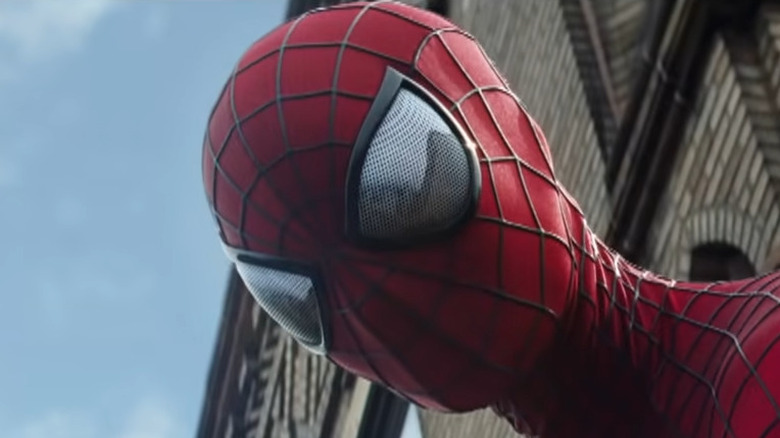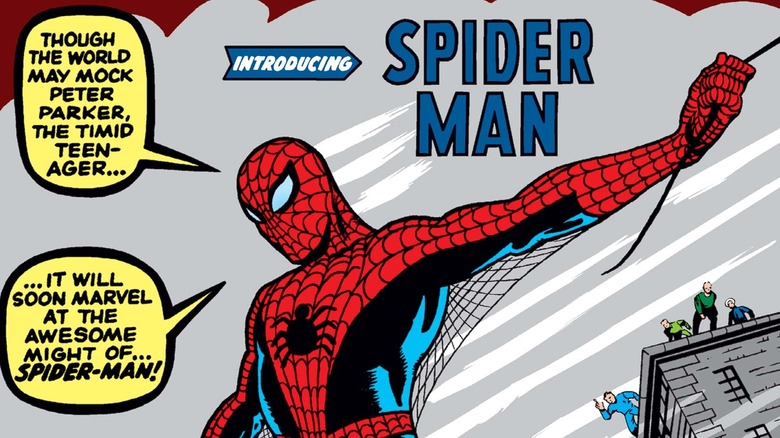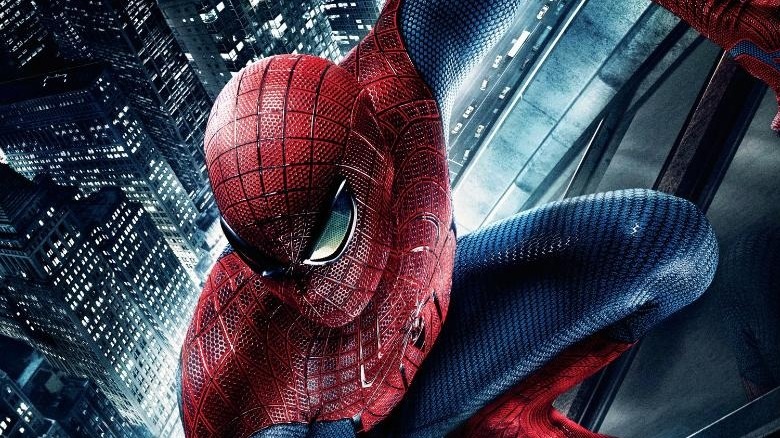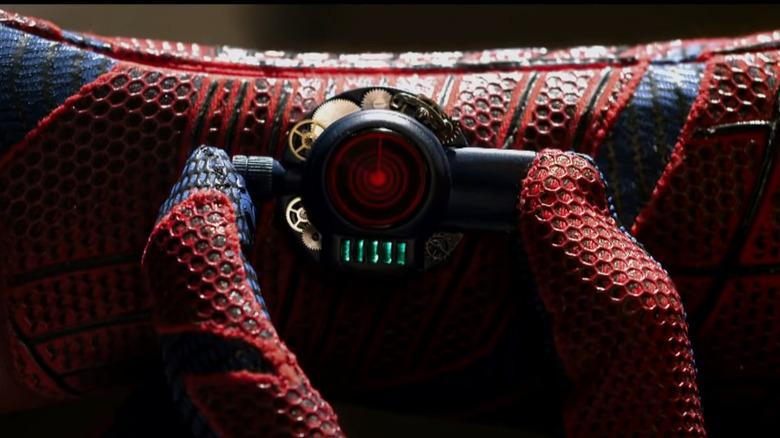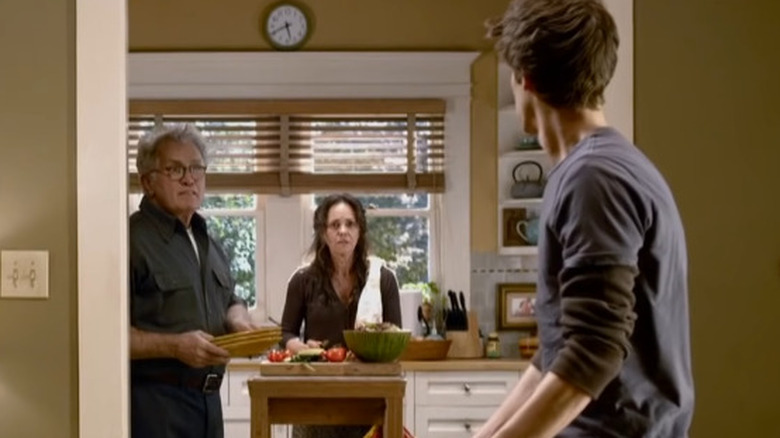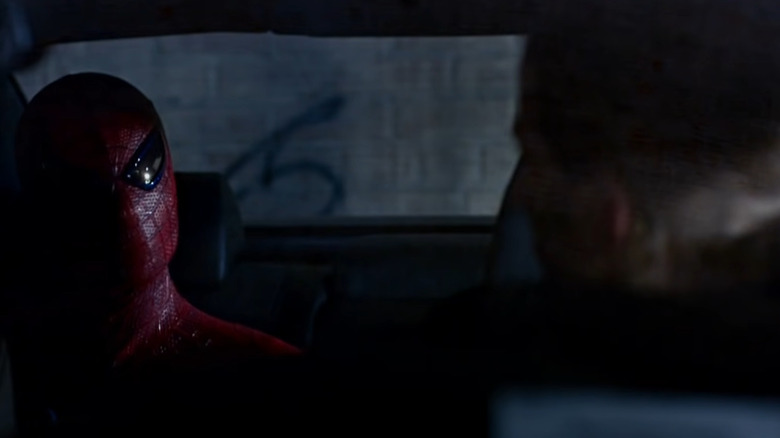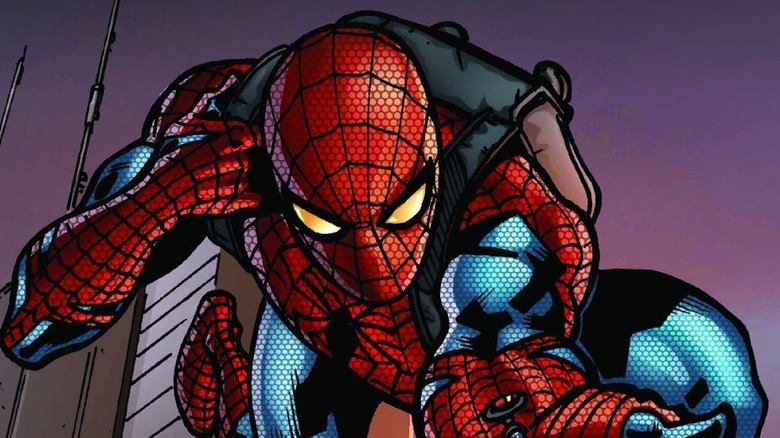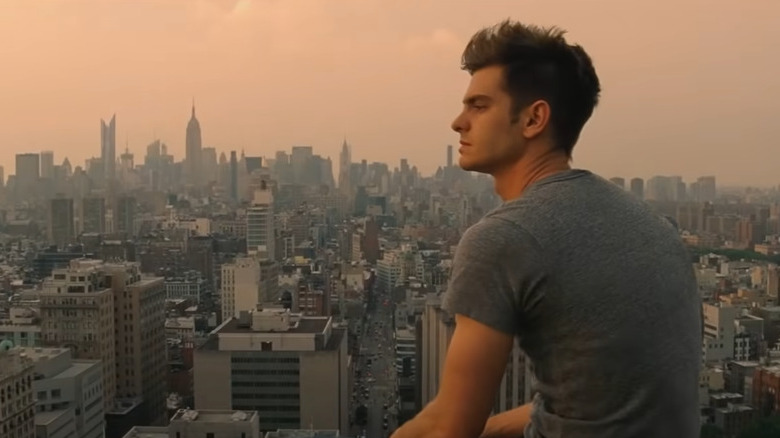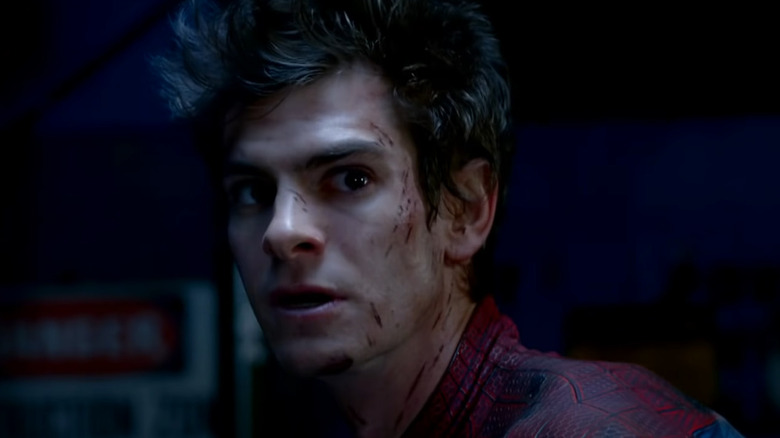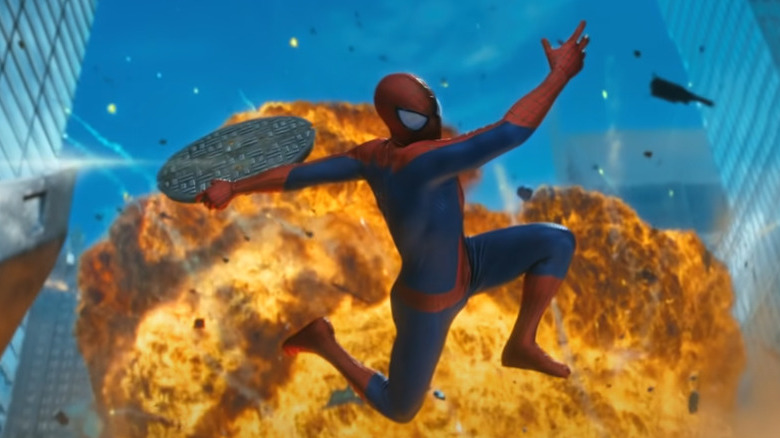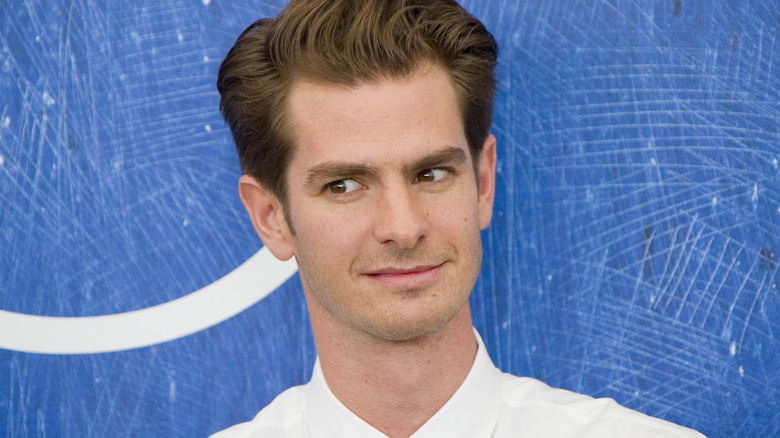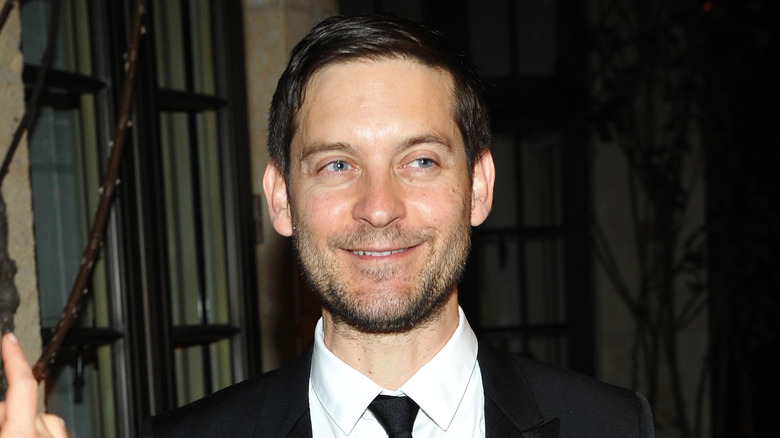What You Don't Know About Andrew Garfield's Spider-Man
One can argue that among all the actors who portrayed Spider-Man in live action over the last two decades, Andrew Garfield has faced the toughest battle of all. His two films, "The Amazing Spider-Man" and "The Amazing Spider-Man 2," were the weakest-performing among Sony's live-action Spider-Man movies, according to Screen Rant. The two films, which were directed by Marc Webb, are also currently the lowest-rated Spider-Man movies on Rotten Tomatoes. As for the actor himself, Andrew has described his time in Spider-Man's webbed boots as "heartbreaking," which is undeniably a tragic thing to hear from someone who grew up with a deep affection for the character.
The abrupt end to Andrew's run as the webslinger has raised many questions about the ill-fated franchise, including why the planned trilogy became a duology and what the future could have been like for Andrew's version of Spider-Man. Given how the meteoric success of the Marvel Cinematic Universe has enabled his successor Tom Holland to meet and work with other superheroes, it's interesting to think about the position Andrew's Spider-Man could have been in, had the actor's time as the wallcrawler not been cut short. From the circumstances that brought about "The Amazing Spider-Man" and its sequel to the ways Andrew embraced being Spider-Man, here are some interesting facts about the English actor's take on the beloved superhero.
Andrew Garfield's Spider-Man marked the superhero's 50th birthday
Spider-Man made his spectacular debut in the world of comics via 1962's "Amazing Fantasy" #15. His unexpected success created a decades-long, multibillion-dollar franchise with countless spinoff comic books, all kinds of merchandise, and numerous tie-ins and adaptations across different forms of media. These have been crucial in keeping Spider-Man ever-present in the public consciousness — and have helped the superhero become popular and profitable enough to reach his 50th anniversary in 2012.
2012 also marked the 10th anniversary of Sam Raimi's "Spider-Man," which featured Tobey Maguire in the titular role. That film, which helped usher in the modern age of superheroes in cinema, became a critical and commercial success and spawned two sequels. However, a planned fourth Spider-Man film was scrapped in 2010, directly leading to the announcement that a reboot of the franchise would take place in what was incidentally Spider-Man's golden year (via Collider). Months after "Spider-Man 4" was officially canceled, Sony announced that it had found its next Spider-Man in the form of Andrew Garfield (via The Guardian).
The flagship Spider-Man comic book series, "Amazing Spider-Man," commemorated the special anniversary in a way that paid homage to both Tobey and Andrew. "Amazing Spider-Man" #692 was officially marketed as the 50th anniversary issue and featured the debut of Andy Maguire. Named after the two Spider-Man actors, this character gains superpowers in a lab accident and briefly becomes Spider-Man's sidekick under the codename Alpha.
Sony rebooted the Spider-Man films to keep the license
In case you were wondering why Sony seems to be putting out a steady stream of Spider-Man movies every couple of years or so, there's actually a legally binding reason behind it. It's the same reason why the cancellation of "Spider-Man 4" was immediately followed by the announcement of a start-from-scratch approach with "The Amazing Spider-Man": Unless Sony puts out a film starring Spider-Man within a set period of time, the company will forfeit the rights to make new ones, losing a massive cash cow in the process. In other words, the seemingly breakneck pace of Spider-Man film releases has helped keep the character's cinematic future in Sony's hands.
As Business Insider explains, the movie rights to Spider-Man, as well as 900 characters that belong in his corner of the Marvel universe, have been with Sony since 1998. However, the company will lose those rights if it fails to release a new Spider-Man film at a set interval — which in this case is five years and nine months. This pretty much explains why fans have seen three actors portray a live-action version of Spider-Man on the silver screen over the course of two decades: Tobey Maguire in the Sam Raimi trilogy, Andrew Garfield in the Marc Webb duology, and Tom Holland in the MCU films.
Andrew Garfield: The perfect fit for the role
Prior to suiting up as Spider-Man, Andrew Garfield had already been working in films and theater productions since the mid-2000s, including 2009's "The Imaginarium of Doctor Parnassus" and 2010's "The Social Network." However, he was still a fresh face to most of Hollywood when Marc Webb was looking for the next cinematic webslinger — and it was a cheeseburger, of all things, that helped him realize that Andrew was the actor he'd been searching for.
In an interview with Yahoo! Entertainment, the director told the story of Andrew's "ridiculous" tryout scene: "We were doing a scene that's not in the movie, where he was eating a cheeseburger and telling Gwen to, like, calm down or to — trying to put her at ease, while he is eating food. ... I felt like there's something in the way he embodied and committed to that really tiny minutia — I just hadn't seen before." Being a "new face" worked in Andrew's favor as well, in addition to his ability to balance humor and emotional weight.
It also helped that Andrew had been a fan of Spider-Man since he was a child. The actor surprised everyone at the 2011 San Diego Comic Con by showing up in a store-bought Spider-Man costume and making an impassioned speech (via The Hollywood Reporter). Then again, he's the type of person who'd play basketball with kids in full costume, which is just about as "friendly neighborhood" as a Spider-Man can get.
Bringing back the web shooters
One of the most controversial aspects of the Sam Raimi trilogy was the decision to make Spider-Man's webbing organic instead of following the "mechanical web shooter" route from the comics. While this change did make Peter Parker seem a bit more relatable — after all, being blessed with spider-powers AND a genius-level intellect to create a silk-like adhesive and wrist dispensers may seem a bit much for a supposed "everyman" superhero — it ended up irking a lot of fans (via Film Stories). Thus, when "The Amazing Spider-Man” began production, one of the ways it differentiated itself from its predecessors was the incorporation of mechanical web shooters into this version of Peter Parker's story. As it turns out, Sony and the production team made this choice thanks to the advice of one of the most prominent Spider-Man writers of the early 2000s.
In an interview with Yahoo! Entertainment, "Ultimate Spider-Man" writer Brian Michael Bendis revealed that he attended meetings with Sony's creative team for the Spider-Man films. "They sat me down in [producer] Amy Pascal's office with this big roomful of producers and writers and directors, and she looked at me and said 'organic web shooters or mechanical web shooters?'" The scribe — who had no idea that he would be the deciding vote in this situation — opted for mechanical web shooters, much to the chagrin of the team. "So when I see the mechanical web shooters, I feel a little happiness. I feel like I did something good in the world," he said.
'With great power comes great responsibility,' but different
Easily the most memorable line from the 2002 "Spider-Man" movie was the advice that Uncle Ben (Cliff Robertson) gave Tobey Maguire's Peter Parker: "With great power comes great responsibility." This quote has become part of the pop culture lexicon, and has become strongly associated with the character. Interestingly, it's not accurate to how the line originally appeared in the comics. For starters, Uncle Ben didn't even really say it.
In 1962's "Amazing Fantasy" #15, the debut story of Spider-Man ends with the teenage superhero sadly walking away into the night, after realizing that the thief he had allowed to escape earlier ended up being his uncle's killer. In the concluding panel, a caption box reads: "And a lean, silent figure slowly fades into the gathering darkness, aware at last that in this world, with great power there must also come — great responsibility!"
Perhaps in an attempt to further differentiate itself from the Sam Raimi trilogy, "The Amazing Spider-Man" took a different approach to delivering the iconic line. In an emotionally charged scene, Uncle Ben (Martin Sheen) tells Peter: "[Y]our father lived by a philosophy — a principle, really. He believed that if you could do good things for other people, you had a moral obligation to do those things!" Sharp-eared comic book fans would recognize this as a paraphrased version of a line from 2001's Ultimate Spider-Man #4, part of a modernized retelling of Spider-Man's origin story.
Andrew Garfield's Spider-Man never caught his uncle's killer
Peter Parker's realization that his inaction directly led to his Uncle Ben's death is a key part of the Spider-Man mythos. In virtually every incarnation of the character, this pivotal moment in his life is what teaches him to never waver in using his powers for the greater good. In "The Amazing Spider-Man," Andrew Garfield's Peter Parker goes through a similar tragedy, but with a couple of significant differences.
For starters, Peter not only lets the thief get away, but also becomes an accomplice of sorts when the criminal tosses him a carton of chocolate milk as thanks. More importantly — and quite tragically — Peter never manages to catch his uncle's killer in this universe. The film shows Peter hiding his identity as a vigilante and trying to capture the thief by pursuing criminals who matched his physical description (via Screen Rant).
Sadly, Peter's efforts turn out to be in vain, and the film ends with him failing to achieve the goal that put him on the path to becoming Spider-Man in the first place. The sequel didn't even bother to pick up on this dangling plot thread, which is a strange way of handling such an integral part of his origin story.
The costume change in the sequel was explained in a tie-in comic
When the first promo images for "The Amazing Spider-Man" were revealed by Sony, fans saw that the costume that Andrew Garfield would be wearing was a curious departure not just from Tobey Maguire's version, but from the source material as well. This version of the suit had yellow eyes, no red belt, a basketball-like texture, and silver-lined boot soles, among other things. However, "The Amazing Spider-Man 2" zagged where its predecessor zigged, taking Spider-Man's costume much closer to its comic book roots. Interestingly enough, the film never bothered to explain why the change even happened — and Marvel took a different approach to doing so by releasing a digital exclusive comic that filled in the gap between the two films.
2014's "The Amazing Spider-Man: Cinematic" was a short illustrated story in Marvel's Infinite Comic format. Instead of showing the pages as static images like they would appear in a printed comic book, Infinite Comic reveals panels and word balloons one by one upon the reader's prompt (either by clicking or tapping). This particular Infinite Comic shows Andrew Garfield's Spider-Man receiving fashion advice over the phone from his girlfriend Gwen Stacy (Emma Stone), before an accident rips his costume to shreds. Left wearing a suit that has been damaged beyond repair, Peter ponders creating a new one — the same suit fans see in "The Amazing Spider-Man 2" — following Gwen's suggestions.
The first-ever superhero ambassador for Earth Hour
Comic books often depict heroes saving the world in bold, dynamic ways. However, Andrew Garfield's version of Spider-Man took a slightly different approach when attempting to enact some real-life change for the good of the planet: He became the first official superhero for Earth Hour, the annual energy conservation event organized by the World Wide Fund for Nature (WWF).
According to Sony Pictures' official press release, aside from supporting the WWF's fundraising campaigns and events, the creative team of "The Amazing Spider-Man 2" made sure that the film's production and press tour would be carbon-neutral. The movie was also labeled as "the most eco-friendly tentpole production in the history of Columbia Pictures," which is the film production studio division of Sony in charge of the Spider-Man films. "The Amazing Spider-Man 2" even had the tagline "A Greener World" in its ending credits.
That said, some have said that the film's online "EcoSpidey" campaign — the entire Earth Hour collaboration, plus its associated social media accounts — was nothing more than a marketing stunt, "a series of missed opportunities" that "looms toward greenwashing" (via the Media Industries Journal).
Why did Andrew Garfield stop being Spider-Man?
Initially, Andrew Garfield's departure from the Spider-Man films was a mystery to fans. Due to the less-than-stellar box office performance of "The Amazing Spider-Man 2," it wasn't really a surprise to many that Sony decided against making a third movie (via the International Business Times). However, the true reasons behind the end of Andrew's run as Spider-Man were never really confirmed by Sony or Andrew himself. Interestingly, the 2014 Sony email hack ended up revealing much more about the ultimate fate of Andrew's Spider-Man.
According to the Hindustan Times, one of the leaked emails appeared to have been sent an hour before "The Amazing Spider-Man 3" was going to be formally announced at a gala event. The supposed Sony email mentioned that Andrew opted out of the event, for personal reasons: "He has a rather scruffy beard and he just wants to be left alone." This allegedly incensed Sony President and CEO Kaz Hirai, kicking off the events that led to the third film's cancellation.
That said, Andrew has maintained in interviews that he wasn't "fired" from the role of Spider-Man. As he told The Guardian in a 2016 interview: "What I'll proudly say is that I didn't compromise who I was, I was only ever myself. And that might have been difficult for some people."
Scrapped plans to bring on the bad guys
By ordinary standards, "The Amazing Spider-Man 2" wasn't a box office failure. According to Business Insider, it earned $708 million globally. Unfortunately, the cost of making the film, as well as the fact that it was supposed to kickstart Sony's Spider-themed answer to the MCU, made this turnout unacceptable for the studio. As a result, plans to expand the universe via other films were junked, including a villain team-up movie that "The Amazing Spider-Man 2" dropped hints about.
Months before "The Amazing Spider-Man 2" hit theaters, Sony announced that it would be making two other Spider-related films starring the webslinger's enemies (via Deadline). "The Sinister Six," which would have taken the classic Spider-Man villains team to the silver screen for the first time, was scheduled to be directed by Drew Goddard. A "Venom" film was also announced, directed by Alex Kurtzman. While this film was also terminated alongside "The Sinister Six" due to the cancellation of "The Amazing Spider-Man 3," the concept was later revived, leading to the release of an actual "Venom" film, with Tom Hardy in the titular role, in 2018.
As for "The Amazing Spider-Man 3," Marc Webb confirmed in an interview with Entertainment Weekly that it would have focused on Peter Parker coming to terms with Gwen Stacy's death. "How do you recover from that? That's going to play out in the next movie."
Was Andrew Garfield supposed to be the MCU's Spider-Man?
When Tom Holland stepped in as the new cinematic Spider-Man in 2016, he made his debut in "Captain America: Civil War" as a nod to the character's role in the original comic book storyline. Interestingly, the Sony email leaks showed that if negotiations between Sony Pictures and Disney had played out a little differently, it could have been Andrew Garfield stealing the iconic shield from Captain America (Chris Evans).
A 2014 article from Business Insider revealed that email exchanges involving Sony executive Amy Pascal and Disney CEO Bob Iger revolved around a possible collaboration between the two companies. Allegedly, Marvel wanted the webslinger to be part of "Captain America: Civil War." Ultimately, the role was recast, leading to a successful string of Spider-Man films under a Sony-Disney partnership.
Given the dynamic between Spider-Man and Iron Man (Robert Downey Jr.) in the MCU, it would have been strange to see how Andrew's Spider-Man would react to the billionaire superhero. The actor shared his thoughts in response to a Quora question about how the MCU Iron Man would treat his Spider-Man (via Comic Book Resources). Surprisingly, Andrew didn't think they'd get along that well: "I think he would be a little turned off by the excess, the billionaire, trillionaire status of Ironman [sic]. ... But maybe there could be some influence there. Maybe my Peter Parker could wake Tony Stark up to his own egoic drives a little bit. We'll never know."
Was Andrew Garfield's Spider-Man supposed to meet Tobey Maguire's Spider-Man?
With 2018's "Spider-Man: Into The Spider-Verse" introducing the general public to the idea of parallel reality Spider-people and 2021's "Spider-Man: No Way Home" diving headfirst into multiversal mayhem, it's easy to forget that in the mid-2010s, an alleged plan by Sony to have two different cinematic Spider-Men meet was already floating around the internet.
Thanks to an email purportedly leaked from the Sony offices, Spider-Man fans learned about "Spider-Man vs. The Amazing Spider-Man," which would supposedly feature Andrew Garfield's Spider-Man coming face to face with Tobey Maguire's version. It's important to stress that none of the parties involved have ever offered clear or direct confirmation that this was actually in the works. In fact, there's a very good chance that this was nothing more than an internet hoax, lost in the shuffle of authentic Sony email leaks.
That said, according to a report from the Wall Street Journal regarding the leaked emails, Sony was at the very least considering bringing back Sam Raimi to either produce or direct new Spider-Man films.
